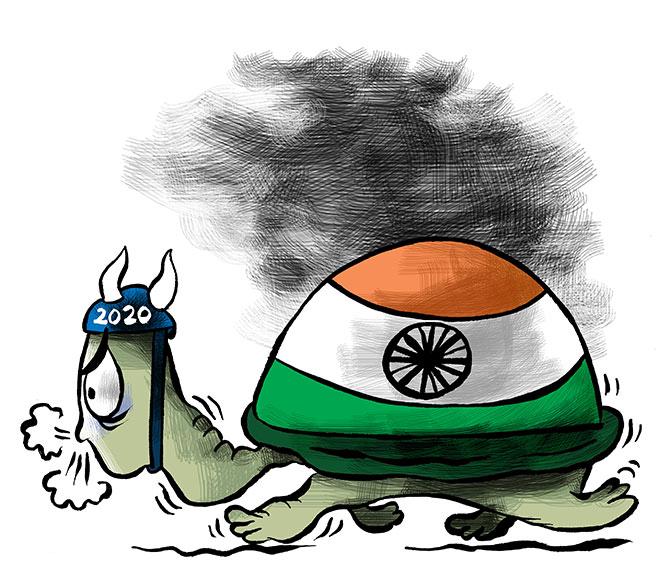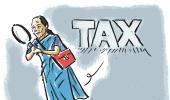'Slowing down of the economy was mainly due to the demonetisation shock...'
'If you cut off the oxygen supply to a patient in the ICU and the patient dies, the patient does not come alive again when you restore the oxygen supply.'
Illustration: Uttam Ghosh/Rediff.com

The latest bad news on the economic front is that the IMF has forecast a GDP growth of below 5% for India in the coming year.
The National Council of Applied Economic Research had already predicted a less than 5% growth three months ago.
Will Budget 2020 have proposals to revive the economy, or like last year's Budget, will it turn out to be another vision statement?
"No right-minded businessman is going to invest in a market that is not showing much promise of growing demand," Professor Sudipto Mundle, Distinguished Fellow at NCAER, New Delhi and a former member of the 14th Finance Commission, tells Shobha Warrier/Rediff.com.
Do you expect anything sweet for the economy in the Budget?
I certainly hope so. The good sign is that unlike earlier when it was in denial, now there is acceptance by the government that there is a genuine problem with the economy, and that there is a serious economic crisis.
Earlier, the government was tinkering with measures on the supply side, such as the corporate tax rate cut which would not help to revive growth. But now it recognises the need to take steps to generate demand.
Let's hope this recognition will get reflected in the Budget.
Which areas should the government focus on so that there is demand generation and also a revival of the economy?
What it should do to generate demand is to spend more on capital expenditure as well as on income support, especially for the poor.
What exactly do you mean by income support?
We have programmes like MNREGA and PM-Kisan to support rural workers and farmers. This should be available for all households, without targeting, and support should be raised to Rs 12,000 per household.
Arithmetic shows that if we give Rs 12,000 a year for all households, it would cost about 2% of GDP only.
But why no targeting?
We should understand that setting up the elaborate administrative apparatus for targeting costs far more money than not targeting. It is a cost-efficient way of providing income support.
Anyway, the middle class or the upper middle class or the rich are not going to queue up for this Rs 1,000 per household per month, so the actual cost will be less than 2% of GDP.
Is it anything like the unemployment benefit given to unemployed people, or employment and wage through MNREGA?
It is neither. This is called universal basic income which has different compulsions in the Western countries, but is a very popular idea there. The compulsions are different in our country.
The idea is to make Rs 1,000 per month available as income support to all families. For a poor family earning Rs 7,000 to Rs 8,000 a month, an additional Rs 1,000 is quite a significant amount.
Now, how do you link this to growth? When you spend 2% of GDP on such income support, it makes more money available to the poor people, who will immediately spend it on consumption. And this will have a very quick and strong multiplier effect, which will help revive growth.
We should also raise expenditure on public infrastructure investment, like building rural roads which will again have a high multiplier effect, and revive growth.
The question is, how will this be financed? Should it be financed by increasing the fiscal deficit? I don't think we should encourage increasing the deficit as very high public sector borrowing, around 9% of GDP or more, has already made the cost of money high and crowded out private investment.
There is a huge untapped area of tax revenue which should be used for higher government spending.
Schedule 7 in the Receipts Budget for 2019-2020 points out that about 5% of GDP is lost as revenue forgone because of concessions and exemptions given on direct taxes, indirect taxes, customs, etc.
This needs to be plugged and curtailed, if not altogether eliminated.
Also, the GST rollout has been faulty, and it is a big mess.
There are huge evasions as the information system, GSTN, the core in administering GST, has not been worked out properly.
If the GSTN is fixed, GST performance would improve significantly.
Also, 5% of GDP goes in the form of non-merit subsidies. When you reduce that, you can make the money available to give monetary support to the poor.
Thus, there are many things like this that can be done to improve revenues. They can also do a reallocation of expenditure from non-merit subsidies to finance extra spending on income support or infrastructure investment without raising the fiscal deficit.
Ever since the NPA issue came out in the open and private investment stopped, experts have been urging the government to start public spending especially on infrastructure for the growth cycle to start...
There is a distinction between what the government should do and what it will do. We, as independent economists, have been talking about what the government should do.
If the government could raise expenditure on public investment and also implement an ambitious income support programme, there will be a revival of growth, and this can be financed without increasing the deficit.
That apart, reform in the finance sector has become very urgent now. Without that, there will not be much revival of credit growth or investment by the private sector.
The government also needs to urgently address the NPA problem in the banking sector. Yes, it has introduced the Bankruptcy Code, etc. These are welcome steps, but it is taking too long because of the resistance from defaulting borrowers.
We need to step up the pace of resolution of the NPAs.
On top of this, we now have this non-banking sector problem also. We need to bring the NBFC sector also into the regulatory network.
Everybody started talking about the NPA crisis in PSB banks after Raghuram Rajan asked the banks to declare NPAs. But more than 20 years ago, when I interviewed Murasoli Maran, he had said that Indian banks need to fix the NPA problem without any delay.
Does that mean public sector banks have been carrying this problem for a very long time?
Yes, the NPA problem is not new; it is very old. That was because the regulator for the banks, the RBI, did not insist on firm standards for them to recognise non-preforming assets.
Once you recognised it, you had to make provision for it from the bank's equity. So, the banks were just postponing the problem and naturally it kept getting worse.
Raghuram Rajan as RBI governor insisted on firm, transparent, standards for the banks to recognise non-performing assets. So, what was hidden or camouflaged till then came out in the open. What he did was a very good thing.
Otherwise, would the public sector banks have collapsed?
Public sector banks will collapse only when the government collapses because the owner is the government.
The first reform they should do is to have a firewall between the government and the banking sector. The government should not appoint the boards of public sector banks.
If there is pressure from powerful people in the government on banks to provide loans to doubtful parties without due diligence, then that's not the way banks can function.
That's why the NPA problem is much worse in public sector banks than in private sector banks.
The difference is, the private sector banks are owned by private parties and they are the ones who will suffer if the bank collapses.
In the public sector banks, no individual suffers when something goes wrong. Only we taxpayers suffer.
The government is pumping in money to recapitalise public sector banks...
What does it mean? It means your money and my money as taxpayers has been used to recapitalise public sector banks. This has to change.
One way is to privatise the banks. Or, you can allow private sector banks to grow faster; anyway, it is already happening. There is a gradual shift of balance in the banking sector from the public sector to private sector.
We have seen it in other industries also. For example, in the airline industry, Air India is not shut down yet, but its market share has become small. We see the same thing in the telecom industry. The market share of BSNL, VSNL has shrunk.
It is imperative to fix the governance system of public sector banks before we pump more money into them. Otherwise, this mess will go on indefinitely.
So, the government should not support these public sector banks with more and more capital infusion without reforms.
Either reform their governance systems, or let them gradually die a natural death.
Do you think the slowing down of the economy was mainly due to the NPA crisis in the banking sector?
Slowing down of the economy was mainly due to the demonetisation shock, plus strong expenditure compression during the last two years.
Many of us had said even then that demonetisation would have a severe adverse effect on the unorganised sector which accounts for the bulk of employment in the country. That has unfortunately turned out to be true.
Even today the MSME sector has not recovered...
Yes, they have not yet recovered.
Some people say the demonetisation effect is over, but it is not yet over. The effect is spread over several years.
If you cut off the oxygen supply to a patient in the ICU and the patient dies, the patient does not come alive again when you restore the oxygen supply. In the same way, the unorganised sector which largely functioned on cash transactions experienced high mortality when 86% of the country's currency was snuffed out.
The currency came back, but the dead businesses could not just come alive again.
The collapse of the non-banking finance companies is also partly the knock-on effect of this crisis in the unorganised sector.
So, would you say the slowing down of the economy is a self-inflicted wound?
I think so. But apart from the impact of demonetisation, I want to stress on another factor behind the slowing down.
During the past two years, we have experienced a huge compression of public expenditure. There was a massive shortfall in tax revenue compared to the Budget targets in 2018-2019 and these were largely passed on as a compression in public expenditure.
The same thing has happened this year too. There is a big shortfall in tax revenue. Now, how do you deal with that?
You can either let the deficit increase or cut expenditure. When the government expenditure gets compressed, in a situation where private investment is not happening, obviously you will have a big decline in growth.
This is why growth has declined sharply during the past two years.
Private investment is not happening as they do not have the confidence to invest even now. The government reduced the corporate tax expecting the investment cycle to start, but nothing of that sort has happened...
Reducing the corporate tax was a bad move, according to me.
By reducing tax, you will not generate confidence in the economy.
When the private sector thinks there is uncertainty and unlikelihood of growth, what will they do with their savings from a cut in the corporate tax? They will use it either to reduce their debt, de-leverage, or pay out more dividends from profits. They are not going to invest.
No right-minded businessman is going to invest in a market that is not showing much promise of growing demand.
How do you think the private sector will get their confidence back?
Growth has to revive. But growth will not revive initially through private investment. It will happen only through higher government spending. Because of the tax revenue shortfall, there has been a severe compression in public expenditure.
This is what led to the crisis in the first place, on top of the demonetisation shock. This needs to be reversed.
Many experts believe the government should not be too obsessed about the fiscal deficit...
Those who say that should understand the implications of a high fiscal deficit.
The fiscal deficit is the measure of how much the government is borrowing. Yes, you can raise your borrowing but with that, the public debt ratio rises.
As the public sector borrowing, already high at around 9% of GDP, rises further, it would push up the interest rate.
When the interest rate goes up, it will further compress private investment.
So, it is important that the deficit does not go up. It will have its consequences. But in a very difficult situation, you have to let the deficit go up a little.
Is what we experience now, a very difficult situation?
Yes, and in this very difficult situation, I think, we should be liberal in allowing the fiscal deficit to go up a little.
But the main strategy has to be raising the revenue.












 © 2025
© 2025